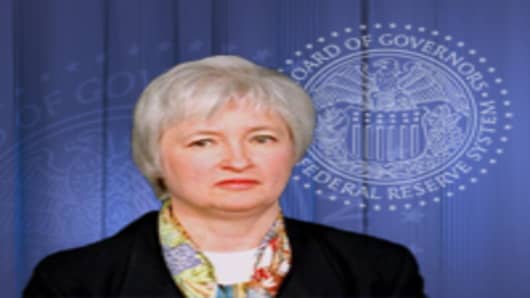The Federal Reserve will not repeat the policy mistakes of the 1970s by letting inflation spiral out of control, San Francisco Federal Reserve Bank President Janet Yellen said Tuesday.
Yellen said benchmark interest rates have been cut far enough given current growth and inflation risks, and that with more weak data almost certainly ahead, it would not make an automatic case for more rate cuts.
"I consider the current level of monetary accommodation to be appropriate," Yellen said in a speech to the Financial Planning Association of Northern California.
Some market-based measures of inflation expectations had risen recently, but Yellen said that she would not characterize expectations as having become unmoored.
"This is not the 1970s, but we can't let it get to be the 1970s. Our behavior is critical to that. We have to be the barrier" to high inflation, Yellen told reporters after the speech. "At a time when commodity prices are rising as rapidly as they are, inflation is a concern," she said.
Those price hikes, especially for energy and food, are taking "a huge toll on households," she added.
The U.S. central bank has slashed its benchmark interest rate to the current 2 percent from 5.25 percent since mid-September in response to a housing and credit market crunch that has pushed the economy to the brink of recession.
The Fed's series of rate cuts, along with the federal tax rebate stimulus program, "should be sufficient to promote a step up to moderate economic growth later this year," she said.
Yellen said the tax rebate checks, now being mailed out, should make a notable difference in the second and third quarters of this year.
In line with comments earlier this month, Yellen gave no indication that she favored another cut to benchmark interest rates, noting that the real federal funds rate -- the fed funds rate less the rate of inflation -- is "at an accommodative level of around zero."
On the other hand, "the Fed will have to be attentive to removing accommodation" as growth picks up, Yellen said, adding that potential rate hikes are "down the road." That suggested the Fed could launch an extended pause in interest rate moves at its next meeting on June 24-25.
Financial markets suggest the Federal Open Market Committee will keep benchmark rates steady for the next few meetings, before possibly starting to raise rates in the fourth quarter.
Prospects for a quarter-percentage point rate increase in October are running at about 50 percent.
Yellen is not a voting member of the FOMC this year.
The economy faces headwind from financial turmoil, the weak housing market and high commodity prices that together make risks to the growth outlook unusually high, Yellen said.
Whether or not the current slowdown is termed a "recession" might not be known for months or even years, when final growth figures can be pored over by the National Bureau of Economic Research, she said.
Global commodity prices have been driven up in part by the weak U.S. dollar and market speculation, but in larger part by fundamental factors, she said, answering questions from the audience.
Despite activity that is "weak across most sectors of the economy," Yellen told reporters that some recent data had come in better than expected, and that even as consumer confidence has slumped, retail spending has held up reasonably well.
The job market has also avoided a worst-case scenario so far, despite four straight months of net losses and 321,000 jobs lost so far in 2008.
"My sense is that the labor market is weak, but not dramatically slow," Yellen said.
She said the further weakness in the housing market still had the potential to create a "negative feedback loop" in the economy as falling household wealth hits consumer confidence and chokes off spending.
The housing market will likely not hit bottom until sometime in 2009, she noted.
Still, Yellen said the Fed is aware that its credibility could be eroded "if people see us at too attentive to downside risks to the economy" at the expense of watching inflation.
Recent inflation data have been disappointing, the San Francisco Fed president said, adding that price pressures should start to ease before long.
"I would expect that inflation will moderate in coming quarters, as more slack in labor and product markets emerges and as commodity prices level off," Yellen said.


